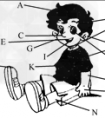写单词。1. Can you name the four great ___________(发明) of China? 2. About ten ___________(百分之) packaging is plastic. 3. The Rocky ___________(山脉;山峰-八年级英语
考点名称:形容词的比较级,形容词的最高级
- 形容词的比较级:
当两种物体之间相互比较时,我们要用形容词或副词的比较级;
当相互比较的物体是三个或三个以上时,我们就要用形容词或副词的最高级。 形容词的比较级和最高级的特殊变化规则:
一、少数单音节词前面加 more-, most- 构成比较级和最高级
tired ---- more tired , most tired
fond ----- more fond , most fond
glad ----- more glad , most glad
bored ---- more bored , most bored
pleased---- more pleased , most pleased二、不规则变化
good /well------- better ,best
bad/badly/ill------ worse , worst
many/much-------more , most
little ------ less , least
far ---- farther, farthes / firther , furthest
old ---- older , oldest (GA)
---- older , oldest / elder , eldest (GB)三、下列形容词和副词的比较级和最高级有两种形式
cruel----- crueler, cruelest /more cruel , most cruel
strict---- stricter , strictest /more strict , most strict
often----- oftener , oftenest / more often , most often
friendly------ friendlier , friendliest / more friendly , most friendly
clever----- cleverer, cleverest / more clever , most clever四、下列形容词和副词没有比较级和最高(即表示”最高程度”或”绝对状态”的形容词和副词没有比较级和最高级)
empty , wrong , perfect , unique , extreme , excellent , favourite (GB)/ favorite (GA) , true , right , correct , extremely ...- 形容词的比较级和最高级用法:
形容词比较等级用法:
1.没有比较对象时,用原级。
I have a new computer.
2.两者比较,程度相同。
A+系动词+as+adj.+as+B.
Our school is as beautiful as theirs.
3.两者比较,程度不同。
A+系动词+not as+adj.+as+B.
The weather here is not as hot as that in the south.
4.A比B更…
The earth is bigger than the moon.
5.比较级前可以用much,even,still,far,a lot,a little,a bit,any等修饰。
Your room is much bigger than mine.
I’m a little shorter than her.
6.用比较级可以表示最高级含义:
John is stronger than any other boy in his class.=John is stronger than any of the other boys.
两者不属于同一范畴,不能用other.
Chongqing is bigger than any city in Sichuang.
7.“比较级+and+比较级” 表示“越来越…”
China is becoming more and more beautiful.
Days are getting longer and longer.
8.用the+比较级,the+比较级 表示”越…就越…”.
The busier he is, the happier he feels.
9. Which/Who+is+比较级 A或B?
A和B哪一个/谁更…?
Which is better,this one or that one?
最高级用法:
表示三者或三者以上的人或物的比较,一个在某方面超过其他两个或多个时,用最高级,结构是
主语+系动词+the+形容词最高级+of/in短语。
This story is the most interesting of the three.
1. one of the+形容词最高级+名词复数
它的意思是最…之一。
English is one of the most important languages in the world.
2. which/who…+is+形容词最高级
“…最...”
Which is the heaviest,the horse,the sheep or the elephant?
3.最高级前可以用序数词
The Yellow River is the second longest river in China. - 形容词的比较级和最高级的变化规则:
构成
原级
比较级
最高级
一般加er,est
tall
taller
tallest
以字母e结尾只
加 r,stlarge
larger
largest
以一个辅音字母结尾的
重读闭音节,双写这一辅
音字母后再加er,estred
redder
reddest
hot
hotter
hottest
thin
thinner
thinnest
以辅音字母+y结尾的词,
将y变为i再加er,esteasy
easier
easiest
happy
happier
happiest
ugly
uglier
ugliest
early
earlier
earliest
其他双音节词和多
音节词,在词前
加more或mostinteresting
more interesting
most interesting
考点名称:动名词
- 动名词:
如果一个动词加上了ing变成了名词,那么这个词称动名词。 动名词是一种兼有动词和名词特征的非限定动词。
它可以支配宾语,也能被副词修饰。
由于动名词是由动词变化而来,它仍保留着动词的某些特征,具有动词的某些变化形式,用以表达名词所不能表达的较为复杂的意念。
动名词的名词特征表现在它可在句子中当名词来用,作主语、宾语、表语、定语。 动名词的结构和形式:
动名词的否定结构:
动名词的否定结构由not 动名词组成。如:
Trying without success is better than not trying at all. 实验没有成功也比不实验好。
He hated himself for not having work hard. 他悔恨自己没有用功。
I’m sorry for not having telephoned you before. 很抱歉,没有早给你打电话。
He felt sorry for not having done the work well. 他为没有把工作做好感到难过。
I fancy it has done you a lot of good not going. 我看不去对你倒好了。
(not going 是动名词一般式的否定形式)
There is no denying the fact that he si diligent.
(no denying 也是动名词一般式的否定)动名词复合结构:
通常情况下,动名词的逻辑主语为谓语动词的主语。如果动名词动作的发出者不失谓语动的主语时,则需要有自己的逻辑主语物主代词或名词所有格加动名词就构成了动名词的复合结构,这种结构在句中可以作主语,宾语等。
(1)逻辑主语是有生命的名词作主语时,必须用名词或代词所有格,作宾语时(尤其在口语中),也可用名词普通个或人称代词宾格。如:
Do you think my going there will be of any help?
你看我去会有什么帮助吗?(宾语)
The student’s knowing English well helps him in learning French.
这位学生通晓英语对他学法语很有帮助。(主语)
Do you mind my(me) smoking ? 你介意我抽烟吗?(宾语)
They insist on Mary’s (Mary) going with them there.
他们坚持要玛丽跟他们一起去那儿。(介词宾语)
(2)逻辑主语是无生命名词是,通常只用名词普通格。如:
Do you hear the rain pattering on the roof?
你听见雨点打在屋顶上了吗?
Is there any hope of our team winning the match ?
我们对赢得比赛有希望吗?
(3) 逻辑主语是指示代词或不定代词this that , somebody , someone , nobody, none, anybody, anyone 时,只用普通格。如:
- 最新内容
- 相关内容
- 网友推荐
- 图文推荐
| [家长教育] 孩子为什么会和父母感情疏离? (2019-07-14) |
| [教师分享] 给远方姐姐的一封信 (2018-11-07) |
| [教师分享] 伸缩门 (2018-11-07) |
| [教师分享] 回家乡 (2018-11-07) |
| [教师分享] 是风味也是人间 (2018-11-07) |
| [教师分享] 一句格言的启示 (2018-11-07) |
| [教师分享] 无规矩不成方圆 (2018-11-07) |
| [教师分享] 第十届全国教育名家论坛有感(二) (2018-11-07) |
| [教师分享] 贪玩的小狗 (2018-11-07) |
| [教师分享] 未命名文章 (2018-11-07) |






